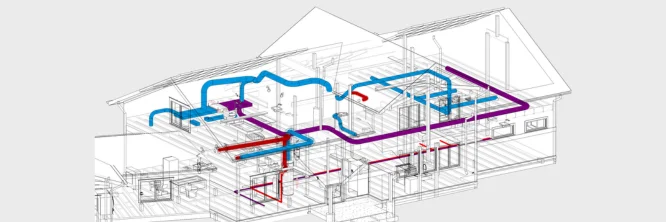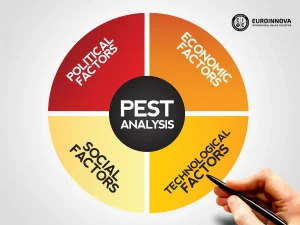An HVAC system, short for heating, ventilation, and air conditioning, is a complex network of components designed to provide comfortable indoor environments. The parts of an HVAC system work together to regulate temperature, humidity, and air quality. Whether it’s a chilly winter day or a sweltering summer afternoon, your HVAC system ensures your home or office remains at a comfortable temperature. In this article, we will explore the key components of an HVAC system, their functions, and how they contribute to a healthy and comfortable indoor environment.

What is an HVAC system?
An HVAC system is a technology that regulates the temperature and humidity within a building. It does this by controlling the circulating air and removing excess moisture or heat. HVAC systems are essential for maintaining indoor comfort and air quality.
Key elements of HVAC systems
The components of an HVAC system can vary depending on the specific type of system and its size. However, most HVAC systems share common elements:
- Furnace or Heat Pump: This is the heart of the heating system. Furnaces burn fuel to produce heat, while heat pumps transfer heat from one place to another.
- Air Conditioner: The air conditioner is responsible for cooling the indoor air. It works by absorbing heat from the air and releasing it outdoors.
- Thermostat: The thermostat acts as the brain of the system, controlling the temperature by turning the heating or cooling system on and off.
- Blower Motor: The blower motor forces air over the coils and through the ductwork.
- Ductwork: The ductwork is a network of ducts that distribute the heated or cooled air throughout the building.
- Air Filter: The air filter removes dust, pollen, and other pollutants from the circulating air.
- Condenser Coil: The condenser coil is located outdoors and is responsible for releasing heat from the refrigerant.
- Evaporator Coil: The evaporator coil is located indoors and absorbs heat from the indoor air.
- Refrigerant Lines: The refrigerant lines carry the refrigerant between the indoor and outdoor units.
- Heat Exchanger: A heat exchanger transfers heat from one medium to another, such as from the furnace to the air.
How cooling systems work
Air conditioning systems use a refrigeration cycle to cool the air. The refrigerant, a special type of fluid, undergoes a series of changes in pressure and temperature as it circulates through the system. The evaporator coil absorbs heat from the indoor air, causing the refrigerant to evaporate. The refrigerant vapor is then compressed, which increases its temperature and pressure. The hot, high-pressure refrigerant is then passed through the condenser coil, where it releases heat to the outdoors. The refrigerant then changes back to a liquid and the cycle repeats.
Types of HVAC systems
There are many different types of HVAC systems available, including:
- Central air conditioners: These systems use a single outdoor unit and a network of ducts to cool an entire home.
- Ductless mini splits: These systems use individual indoor units and an outdoor unit, making them ideal for zoning or adding cooling to rooms without existing ductwork.
- Heat pumps: Heat pumps can both heat and cool a home by transferring heat from one place to another.
- Geothermal systems: Geothermal systems use the Earth’s constant temperature to heat and cool a building.
Reasons to become an HVAC technician
If you’re interested in a career in the trades, becoming an HVAC technician can be a rewarding choice. HVAC technicians are in high demand, and the work can be both Job security: The demand for skilled HVAC technicians is expected to grow in the coming years.
- Good pay: HVAC technicians can earn a comfortable living.
- Variety: HVAC technicians work on a variety of projects, from residential to commercial.
- Problem-solving: HVAC technicians use their skills to diagnose and solve problems.
How to care for your HVAC system
Proper maintenance is essential for keeping your HVAC system running efficiently and effectively. Here are some tips for caring for your HVAC system:
- Change your air filter regularly.
- Schedule annual maintenance.
- Keep your outdoor unit clear of debris.
- Listen for unusual noises.
Energy efficiency in HVAC systems
Energy efficiency is a growing concern for homeowners and businesses. HVAC systems can consume a significant amount of energy, particularly during peak heating and cooling seasons. However, there are several strategies to improve the energy efficiency of your HVAC system:
- Upgrade to a high-efficiency system: Newer HVAC systems are often more energy-efficient than older models.
- Seal air leaks: Air leaks can reduce the efficiency of your HVAC system. Sealing air leaks can help to improve energy efficiency and reduce your energy bills.
- Programmable thermostats: Programmable thermostats allow you to set different temperatures for different times of the day, helping to reduce energy consumption.
- Regular maintenance: Regular maintenance can help to ensure that your HVAC system is operating at peak efficiency.
HVAC system installation
Installing an HVAC system is a complex task that should be left to professionals. A properly installed HVAC system will operate more efficiently and be less likely to experience problems. When choosing an HVAC contractor, be sure to ask about their experience, licensing, and certifications.
Troubleshooting common HVAC problems
If your HVAC system is not working properly, there are a few common problems that you can try to diagnose and fix yourself. Some common HVAC problems include:
- Thermostat issues: If your thermostat is not working correctly, it can prevent your HVAC system from turning on or off.
- Airflow problems: If there is a problem with the airflow through your HVAC system, it can affect its performance.
- Refrigerant leaks: Refrigerant leaks can cause your HVAC system to stop working properly.
- Electrical problems: Electrical problems can also affect the operation of your HVAC system.
If you are unable to resolve the problem yourself, it is important to call a professional HVAC technician for assistance.
An HVAC system is a complex network of components that work together to provide comfortable indoor environments. By understanding the parts of an HVAC system and their functions, you can better appreciate the technology that keeps you comfortable. Regular maintenance and care will help ensure your HVAC system operates efficiently for years to come.





